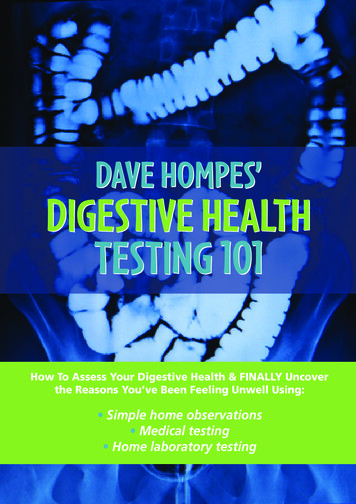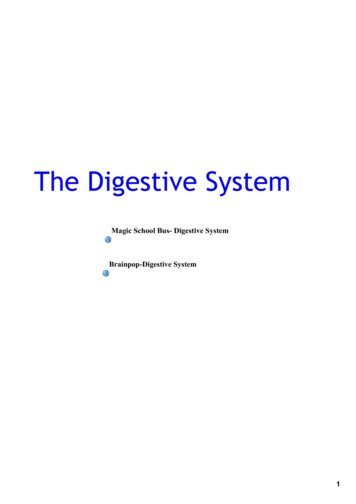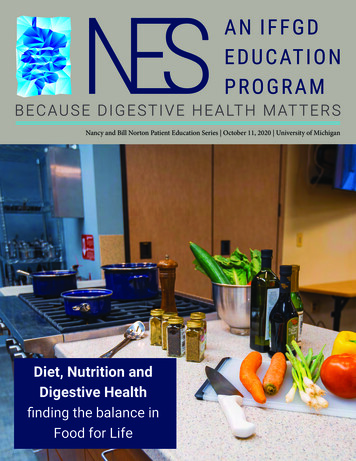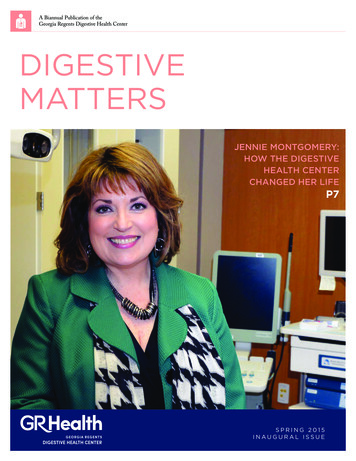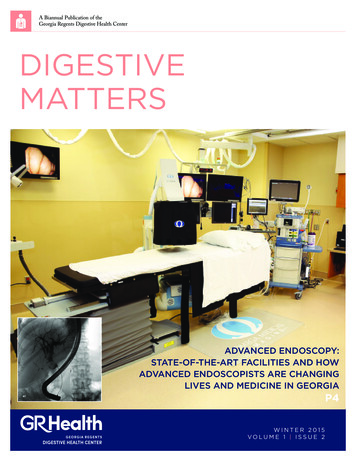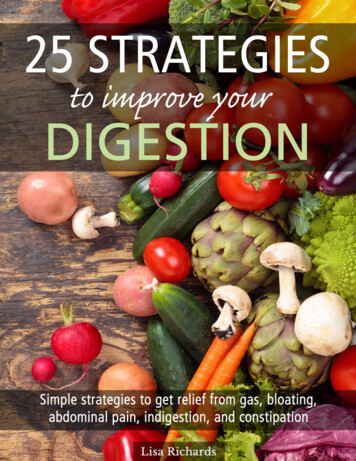
Transcription
!1
What Is The Digestive System?1. Eat Less Processed Food2. Stay Hydrated3. Move Around4. Eat Fermented Foods5. Limit Alcohol Consumption6. Feed Your Stomach Acid7. Chew Your Food8. Probiotic Supplements9. Manage Your Stress10. Use Essential Oils11. Avoid Foods that Irritate Your Digestive System12. Give Thanks for the Food13. Don’t Overeat14. Avoid Harsh Laxatives15. Avoid NSAIDS16. Eliminate Cold Foods And Drinks17. Maintain a Healthy Weight18. Limit Bad Fats And Increase Good Fats19. Don’t Eat or Drink Before Going to Bed20. Eat at the Same Time Every Day21. Eat Foods in the Right Order22. Practice Mindful Eating23. Get a Food Sensitivities Blood Test Done24. Start Each Meal with Something Bitter25. Increase intake of 17
25 Strategies To Improve Your DigestionDigestive disorders are truly a health crisis today. It is estimated that close to 70 millionAmericans suffer with some type of digestive disorder. These digestive disordersinclude conditions such as chronic constipation, diverticular disease, acid refluxdisease, hemorrhoids, inflammatory bowel disease, excessive gas and bloating, ulcersand irritable bowel syndrome. Other digestive conditions not recognized in thesenumbers include SIBO, Candida overgrowth, and other forms of gut dysbiosis. The realnumber is probably much higher than 70 million.These digestive diseases are responsible for 50 million visits to the doctor each year,more than any other type of medical problem. Besides symptoms obviously related todigestion problems, many doctors suspect that digestion-related issues may beresponsible for other diseases such as diabetes, kidney and gall stones, varicose veins,rheumatoid arthritis, gout, hypertension, and obesity. Then there is the gut-brain axistoo. There are researched connections between the gut and depression, low mood,and anxiety.What Is The Digestive System?Let’s start with the basics. Roughly speaking, the digestive system is made up of thestomach, the intestines, the pancreas, the liver, the gallbladder, and the esophagus.Any part of the digestive system may be disrupted. But, as Hippocrates (the father ofmodern medicine) once said, “All disease begins in the gut.”Since proper digestion is the cornerstone to good health, it’s no wonder those thatsuffer from digestive disorders tend to feel ill on many levels. Digestion is responsiblefor providing essential nutrients to your entire body, so a misfiring digestive tract maylead to fatigue, memory problems, a weakened immune system, or even depression.There are a number of things that pretty much everyone can do to improve theirdigestion. Most involve simple changes of habit, or the addition or subtraction of foodfrom the diet. We’re going to take a look at 25 of those strategies in this ebook.All of these 25 tips should be helpful for Candida sufferers, and indeed they should beuseful for most people suffering from other chronic, gut-related conditions. For moreinformation on how to treat Candida with diet, lifestyle changes, and supplementation,!3
remember to check out the Ultimate Candida Diet plan. It contains all the informationyou need to restore your gut health and get your energy levels back to normal.As always, be sure to visit a doctor before starting any new regimen to insure that thereisn’t something more serious causing your digestive distress.1. Eat Less Processed FoodEating fewer processed foods will help you digest your foods better. While people mayunderstand that processed foods aren’t as good for you as raw or unprocessed foods,how many know exactly why this is true?First of all, processed food often lacks fiber. The Institute of Medicine recommends thatfiber intake be about 38 grams for men under 50 years old and about 25 grams forwomen under 50. If you eat too much processed food, chances are that you aren’tgetting enough fiber.You should also know that not all dietary fiber is the same. There are two kinds –soluble and insoluble. Many processed foods contain synthetic additives that allowthem to be called a good source of fiber. Usually, it is insoluble fiber that is added.In a 2007 editorial, Tan and Seow-Choen, researchers in Singapore, called insolublefiber (the kind added to processed foods) the “ultimate junk food” because it is neitherdigestible nor absorbable and therefore has no nutritional value. They point out theirony that adding fiber to foods lacking fiber may cause them to be even less nutritiousthan if the fiber hadn’t been added. The problem, they state, is that excess insolublefiber binds to essential nutrients such as zinc, magnesium, calcium and iron, preventingtheir uptake into the body’s system.Of course, there are many healthy, natural sources of insoluble fiber. It can help to bulkto your stool, and enables food to pass more quickly through your stomach andintestines. But if the majority of the fiber that you eat is insoluble, it can start tonegatively affect the way you digest your food.Furthermore, the sugars and refined carbohydrates in processed foods may contributeto overgrowth of Candida or other pathogenic microorganisms in the gut, causingindigestion and perhaps even contributing to obesity. Candida needs sugar to build itscell walls, create biofilms, and expand through your gut. By limiting your sugar intake,you can deprive it of the food source that it needs.!4
Still not convinced that processed foods are bad for you? Read this.Foods that you should avoid include most crackers and chips, breakfast cereals, andprocessed meats such as bacon and salami. Here’s a general rule: if there are morethan three or four ingredients on the label, that’s probably a bad thing!2. Stay HydratedIt’s very important to stay hydrated throughout the day to keep your stool soft and easyto pass. Water is needed in the stomach to maintain a healthy mucosal lining, which inturn supports the good bacteria in the small intestines as they break down food andabsorb nutrients.While it’s vitally important to drink enough water, it’s also necessary to check the qualityof that water. Sometimes, additives such as chlorine, chloramines, and fluoride areadded to municipal water supplies for purification purposes. While they are generallysafe at low levels, they can still affect the composition of your gut flora. For those withsensitivities, even low levels of these chemicals can cause intestinal discomfort andindigestion.Those who drink well-water face the opposite problem, especially if the water is nearany kind of concentration of animals. The bacteria entering the water may not getkilled, and the water may not be as pure as you imagine.The best solution to both problems is to purchase a water filter that removes as manycontaminants as possible. A reverse osmosis system is a good example. Removing thechemicals and impurities from the water will almost certainly improve your digestivehealth.Water is not your only option on the Candida diet. Here are some more drink ideas.3. Move AroundExercise can affect the digestive system in both good and bad ways. Furthermore,different types of exercise can have different effects. According to the Mayo Clinic, fulldigestion takes something like 53 hours on average. Certain exercises can improve theefficiency of the digestive system, whereas others can compromise it.!5
Light exercise, such as riding a bike or walking, can help to reduce the heartburnassociated with certain digestive problems. Light exercise increases blood flow to theorgans and stimulates muscles in the digestive tract. It increases the heart rate andbreathing and promotes more efficient bowel movements. This kind of exercisestimulates the intestinal muscles, encouraging them to move contents through thedigestive system.On the other hand, heavy exercising (such as running) can actually promote digestiveproblems. Runners who train hard often complain of diarrhea, nausea, and acid reflux.Vigorous exercise can increase cortisol production, which temporarily slows down yourdigestive processes as resources are switched to your sympathetic nervous system (the‘fight or flight’ reaction).Also remember that it’s best not to exercise on a full stomach; wait about two hoursafter a large meal to begin your exercise routine.Here is some more information on exercise and Candida.4. Eat Fermented FoodsYou can heal your gut by repopulating it with the beneficial bacterial that aid indigestion. Most of us acquire these bacteria during birth or early childhood, butinfluences like broad-spectrum antibiotics and a high sugar diet can lead to dramaticand unwanted changes. The easiest way to restore balance in these beneficial bacteriais by eating fermented foods. While this may sound unappetizing, you might alreadyeat a good deal of fermented food, perhaps without realizing it.A number of foods are fermented, and some are staples of our diets. Sauerkraut,yogurt, kefir, kombucha (a fermented tea), and kimchee are all examples of fermentedfoods. Each is high in probiotics, or beneficial bacteria. Not only do these goodbacteria aid in digestion, but they also assist in hormone production, the breakdown ofnutrients, and the development of a strong immune system.However, be careful what you buy. Store-bought fermented foods, in some cases, maydefeat the whole purpose of eating fermented foods. Sometimes these foods are ladenwith salt or sugar, can be over-processed, or are pasteurized. Pasteurization involvescooking the food at a high heat, which kills both bad and good bacteria. What youreally want is raw fermented foods. Making your own is usually the best solution, and isusually pretty easy!!6
Here is some comprehensive information on fermented foods and the fermentationprocess.5. Limit Alcohol ConsumptionDespite the advice above to eat fermented foods, some of them can be quite harmful.Fermented drinks such as beer, wine, or other alcoholic beverages are bad news if youalready have issues with your gut health.Alcoholic beverages irritate the stomach lining, change liver metabolism, weaken yourimmune system and much more. You can read more about the damaging effects ofalcohol here.Is alcohol contributing to your Candida? As you can see, alcohol can have numerousnegative effects on your body. It reduces your body’s capability to prevent a Candidaovergrowth, and prevents it from dealing with the byproducts that lead to itssymptoms.6. Feed Your Stomach AcidWhile it may seem hard to believe, heartburn, acid reflux, abdominal bloating andother digestive system issues are often the result of too little stomach acid rather thantoo much. These symptoms often prompt people to buy antacids, furthering theproblem.When food enters the lower stomach, hydrochloric acid is released, which triggers therelease of the digestive enzyme called pepsin. This sterilizes the food before it entersthe gastrointestinal tract. Low stomach acid interferes with this process, and causes amyriad of problems, including iron and magnesium deficiencies. Furthermore, largeamounts of food that isn’t fully digested may enter the intestines.Sometimes heartburn relief can be counter-intuitive. Instead of antacids, reach forapple cider vinegar or lemon juice. As a preventative measure, especially if you sufferfrom frequent heartburn, mix the juice of a fresh squeezed lemon and one tablespoonof apple cider vinegar into a glass of warm water at breakfast time.Here is some more information on low stomach acid.!7
7. Chew Your FoodIn this case, it turns out that your parents’ advice is pretty good. In our fast-paced worldwe often ‘inhale’ our foods. This is usually because we have a limited time in which toeat the meal. May people only get a 30 minute lunch break, and that includes walkingout the office and coming back!Equally, eating a slow, sit-down breakfast may be impractical if you have two kids to getready for school. If we eat any breakfast at all, it’s usually on the run.Chewing is not only the first stage of digestion, but it also signals the organs to secretedigestive juices, including saliva and stomach acid. These help with the breakdown offoods, and enable you to extract nutrients from your foods more effectively. Chewingyour food well also signals the brain when your stomach has had enough, so it switchesoff your hunger more quickly.At first, it helps to count your chews. Aim for about 20 chews per bite. Not only will youstart feeling fuller faster, but your body will be able to harvest nutrients better andyou’ll enjoy your food more. And the most important benefit is that your digestion willimprove.8. Probiotic SupplementsProbiotic supplements have been shown, time and time again, to improve yourdigestion. Probiotic bacteria are live organisms that are similar to the microorganismsnormally found in your gut. These microorganisms break up your food and makesnutrients available to your body. They also strengthen the immune system and reduceinflammation.It’s usually better to get probiotics from the food you eat. Sauerkraut, kefir andprobiotic yogurt are good examples. However, probiotic supplements are also apractical, effective option. Probiotics have been shown to improve indigestion, alongwith other gastrointestinal problems such as diarrhea and constipation. They are agreat way to recover gut bacteria after an antibiotic regimen.Look for supplements that contain at least 10 billion live bacteria (the amount that’susually consumed in a small container of yogurt). Supplements that contain severaltypes of probiotics are preferable to those that contain only one type. Most commercialprobiotics contain one or more strains of Lactobacillus acidophilus, Lactobacillus!8
fermentum and/or Lactobacillus rhamnosus, as well as Bifidobacteria bifidum and/orBifidobacteria longum.It’s best to take probiotic supplements shortly before or during a meal. This gives themthe best chance possible to make it through your stomach acid and effectively colonizeyour gut.You can find our current recommendations for probiotics here.9. Manage Your StressWhen we are stressed, our bodies release a hormone named cortisol. Along withadrenaline, this is commonly known as one of your ‘stress hormones’.Cortisol has many functions. If you are super-stressed and your body is producing toomuch cortisol, it can slow down your digestive system. This is a part of your ‘fight orflight’ reaction that diverts resources to crucial, life-saving bodily functions. Your salivaproduction slows, and your digestive system simply stops doing many of its jobs.Equally, low cortisol can cause problems too. Cortisol is like the ‘off switch’ forinflammation, and low cortisol means increased inflammation in your digestive tractand elsewhere. Chronic stress can, over time, affect your ability to produce cortisol insufficient amounts.Here are some more ways in which stress can affect your digestive system, and what todo about it!10. Use Essential OilsIf you’re suffering from indigestion, there are several essential oils that may bring relief.Not only do these essential oils help aid indigestion, they may also prevent it withregular use.The essential oils most effective against indigestion include lemon, lemongrass, myrrh,fennel, ginger, peppermint and patchouli oils. Not only do they relieve indigestion, butsome also have side benefits of being anti-inflammatory, antifungal and anti-parasitical.!9
Take care when using essential oils. Try small amounts first to be sure you have noallergic reactions. For the most part, essential oils are safe and free of harmful sideeffects when used properly. Before applying to skin, apply to a small area first. When indoubt, seek professional guidance.Here is a more detailed guide to essential oils.11. Avoid Foods that Irritate Your Digestive SystemMany people have digestive troubles following the ingestion of foods like gluten, dairy,corn, soy, nuts, eggs, chocolate, coffee, or spicy foods.Avoiding gluten is particularly important for those with Candida or some other form ofgut irritation. If you are already suffering from a disturbed gut flora and a permeableintestinal lining, eating gluten can trigger an inflammatory response that will set youback. Focus on avoiding foods that will inflame your digestive system, and eating foodsthat will help to repair it.Some people are deficient in lactase, which is responsible for the breakdown of lactosein dairy products. Without sufficient lactase, foods like milk can cause discomfort andirritate the intestinal membrane.Pay particular attention to how you feel after eating the foods mentioned above. Hereis a comprehensive list of foods to avoid while on the Candida diet.12. Give Thanks for the FoodGiving thanks for your food isn’t necessarily a just a religious habit, and it needn’tinvolve prayer if you’re not religious. It has benefits for those in the secular realm aswell.When giving thanks before a meal, your body prepares for digestion. The anticipationof food begins the first phase of digestion, causing the brain to instruct your body tobegin producing stomach acid and digestive enzymes. Saliva will be released as well.Once food is swallowed, the stomach and intestinal digestive process begins.The cephalic stage, or the brain’s reaction to the anticipation of food, is similar to a keyin the ignition of a car, communicating to the rest of the engine that it’s time to get!10
starting. Taking the time to think about your meal and give thanks for it provides anumber of benefits that allow for better digestion.13. Don’t OvereatOne of the major causes of stress on your digestive system may be simply eating toomuch food. After eating a huge meal, your stomach and intestines just struggle toprocess that large amount of food. There aren’t enough enzymes, bacteria, andstomach acid to do the job.This can lead to gas, indigestion, bloating, and more. If foods remain undigested fortoo long, they can promote conditions like a bacterial or fungal overgrowth. Excessfermentation and gas in the intestines can lead to abdominal pain. You don’t get thesame nutritional benefits from food that isn’t fully digested either.Many medical professionals recommend eating several smaller meals instead of threebig ones throughout the day. This is good advice!14. Avoid Harsh LaxativesLaxatives have a powerful effect on the digestive system, and when used properly canrelieve you of constipation. But laxatives can cause digestive problems too.The laxatives that you purchase at the store are for short-term use, and certainly notintended to be a part of your daily diet. Using excess amounts of commercial laxativescan lead to dehydration, mineral loss, and weakening of the colon. Furthermore, harshlaxatives move food through your system fast, cutting digestion time and possiblyreducing the nutrients that you are getting from your food.There are natural remedies that pose fewer risks and don’t cause indigestion. Taking afew tablespoons of olive, castor, or coconut oil may ease the pressure in yourintestines, allowing food to pass more easily. Drinking lots of water will preventconstipation, and a little senna tea will help if things do get backed up.!11
15. Avoid NSAIDSNSAIDS are pain relievers such as aspirin and ibuprofen, as well as several prescriptionmedications. Aspirin is often recommended for people at risk for strokes or heartattacks because it thins the blood, and arthritis sufferers take NSAIDS for their antiinflammatory qualities. However, regular use can lead to serious issues in your digestivesystem, causing pain and indigestion.The American College of Gastronomy reported that up to 60% of arthritis patients whouse NSAIDS regularly will suffer some of the side effects associated with regular use,such as ulcers, bleeding, heartburn, and holes in bodily tissues. There is a risk of heartproblems associated with the use of naproxen. A report appearing in PostgraduateMedicine that 100,000 Americans per year are hospitalized as a result of the sideeffects of NSAIDS.The reason why NSAIDS are so tough on the digestive system lies in the fact that theyinterfere with your stomach’s ability to protect itself against its own acids by blockingan important enzyme. The National Digestive Diseases Information Clearinghousestates that NSAIDS hinder the protective mechanisms of the stomach, allowing thedigestive juices to damage sensitive stomach lining.16. Eliminate Cold Foods And DrinksSensitivity to the warmth or coolness in our foods is highly individualistic, but it’s worthyof discussion. Scientific testing has shown only that everyone reacts differently to wateror food temperature, not that warm foods are better than cold foods.For the most part, however, studies have suggested the best temperature at which toeat foods or drink liquids is about 98 degrees Fahrenheit, or equal to our own bodytemperature. At other temperatures, the body tends to delay emptying food from thestomach and gut, which causes some people who are sensitive to that to experiencepain and indigestion.Some experiments have shown that drinking cold water during a meal may cause fat tosolidify and not digest properly. However, water is a critical element of digestion andthe stomach actually secretes water during the digestion process. Water also washesdown food out of the esophagus and breaks up food.!12
17. Maintain a Healthy WeightThe more excess weight you carry, the higher the likelihood that you’ll suffer from somekind of heartburn or indigestion. In fact, a study published in the New England Journalof Medicine showed that a little weight gain, even if you’re still within the healthyrange, increases your likelihood of suffering from heartburn.At the entrance to your stomach is a ring of muscle called the esophageal sphincter,which normally closes as soon as food passes through it. If it doesn’t close all the wayor if it opens too often, it can allow acids from your stomach to move into youresophagus, causing heartburn.If you are thinking about losing weight for health reasons, consider losing weight todecrease your heartburn as just another benefit.18. Limit Bad Fats And Increase Good FatsYou should consider cutting out junk or fried foods simply because they are moredifficult for your body to digest. The harder something is to digest, the more likelyyou’ll suffer indigestion, heartburn, constipation, or other digestive issues.Bad fats include trans-fatty acids; hydrogenated fats, like margarine; and omega 6 oilssuch as corn, safflower and canola oils.There are good fats, however, that the liver uses to produce bile, which aids indigestion rather than working against it. Examples like fish oils, olive oil, and grapeseedoil are good for us and can promote healthy digestion.Check out the Candida diet foods to eat list for more healthy fat ideas.19. Don’t Eat or Drink Before Going to BedTypically, your body needs three to four hours to digest your food before you go tobed. If you go to bed right after eating, there is a chance the food can back up into theesophagus or the food may simply be very slow to move through your digestivesystem. Both of these can cause discomfort.!13
If you know you’re going to have to go to bed right after you eat, then eat a smallermeal made up of foods that are easy to digest. Avoid eating citrus fruit, tomatoes,spicy foods, red meat, high-fiber foods, whole grains, and fat-rich meals or desserts justbefore bedtime.Also, try sleeping with your upper body at an incline. To do this, prop pillows underyour upper body. This allows your digestive juices to flow downward instead of upwardinto the esophagus.20. Eat at the Same Time Every DayAlthough this has only been tested in studies on mice, eating at the same times eachday is a logical way to reduce stress on your digestive system.The study in mice indicates that our organs, perhaps, have a period of peak efficiency.Researcher Satchidananda Panda of the Salk Institute for Biological Studies suggeststhat our organs have periods in which they are more or less inactive.In the experiment, one group of mice was allowed to eat as much as they wantedwhenever they wanted. Another group ate all their food within one 8-hour period. Bothate the same number of calories, but one group gained weight and the other didn’t.The mice that ate their calories within a restricted time window weighed 28% less thanthe other mice.There is evidence that eating at regular times can help to prevent obesity, diabetes,and liver diseases, as well as reducing inflammation. Inflammation tends to be aproblem faced by Candida sufferers, but an anti-inflammatory diet can help to fix that.Other studies have found that people who eat at random times every day had higherblood pressure and BMIs than people who stuck to an eating schedule.21. Eat Foods in the Right OrderBelieve it or not, sometimes the order in which you eat your food affects the digestionof that food. Certain foods take less time to digest and other food more time. Thetheory is that you should eat things in the order in which they digest.!14
Fruits only take 20-30 minutes to digest and should be eaten first. Berries are thefastest, but harder fruits like apples or pears take a little more time. Then, eatvegetables, which take 30 to 40 minutes to digest. Cucumber, peppers and cookedveggies take less time to digest, while root vegetable take more time.Grains, beans and lentils take about 90 to 120 minutes to digest. They digest morequickly if cooked, and more time if they are raw. Dairy takes about 90 to 120 minutes,with the exception of cheese, which takes a lot more time.Meats generally take longer to digest. Eggs and fish take about 30 to 60 minutes, whilechicken takes 90 to 120 minutes. However, heavier meats like beef, lamb and pork cantake up to 5 hours to digest. Cheese, particularly those high in fats, can take up to 5hours as well.So, this means that, when you have a full meal before you, you eat fruits first, even ifthey are part of the desert. Then eat vegetables, starting with softer vegetables themmoving on to root vegetables. Lastly, eat the meats.22. Practice Mindful EatingAlthough it doesn’t seem like thinking about your food would cause you to have betterdigestion, it does. Being mindful helps you to slow down and give your body time todigest your food properly.It’s not uncommon to eat meals in front of a computer, the TV, while standing up, whiledriving, or while engaging in many other activities. When we eat meals while doinganother activity, sometimes we don’t even feel as if we’ve eaten. You may not evenremember how the meal tasted!When we eat too fast, or while under stress, digestive problems like indigestion andconstipation become more common.Mindful eating, on the other hand, involves treating eating as an activity by itself. Toeat mindfully, first eat while sitting down at a table, or go outside and eat in a park.Honor the food with thanks - you don’t have to be religious to do this. Simply take amoment to acknowledge the importance this food has in your ability to live. Chew eachpiece thoughtfully, thinking about its texture, flavor and how your stomach feels when itreceives the food. Chew each bite thoroughly. Don’t multi-task.!15
If possible, enjoy home-cooked meals. Making food from scratch helps us connect to itmore and allows us to better appreciate it.23. Get a Food Sensitivities Blood Test DoneAlthough the terms “food sensitivity” and “food allergy” seems interchangeable, theyare actually very different things. Nearly a third of Americans think they have a foodallergy, when in reality, only 4 to 5% of people actually do. Most people think that anyadverse reaction to food means they have an allergy.Food allergies are very specific, and cause the immune system to over-react, releasinghistamine. The histamine can trigger symptoms that range from mild to severe, and caninclude hives, itching, wheezing and other symptoms that are more serious. Doctorscan test for this by looking for IgF antibodies in your blood.Food intolerances or sensitivities, on the other hand, just indicate foods that may notagree with you. Blood tests to determine sensitivity look for IgG antibodies. Someprofessionals argue that the tests aren’t as valid as the one for food allergies becausethey return a number of false positives, and people who have outgrown theirintolerance might still show increased IgG readings.However, a number of people give credit to these tests for helping them determinewhat causes pain and indigestion when eating. The test isn’t always necessary though.Simply removing the suspect food from your diet, at least temporarily, might be a lesscostly alternative.24. Start Each Meal with Something BitterBitter foods tend to get the salivary glands going, and help the stomach start secretingdigestive juices. Appetizers may sometimes include something bitter to stimulate theappetite, and signal the digestive system that food is on its way.Bitter foods such as dandelion greens, artichoke, beet leaves, or arugula are great waysto start a meal. Swedish bitters or apple cider vinegar can also start the process. Thebitter herb hops is used in beer and elicits a similar reaction.This works well if you’ve eaten too much or are having trouble digesting your meal.Consider keeping some Swedish bitters on hand for such occasions.!16
25. Increase intake of MagnesiumA magnesium deficiency may not be the root cause of your digestive problems, butMagnesium can certainly help to resolve digestive issues. Magnesium helps to relax themuscle at the end of the esophagus, allowing food to go down more easily. Along withbeing a muscle relaxant it’s also anti-inflammatory, helping rid the digestive tract ofinflammation that may delay digestion. And it works as a gentle laxative too.Most of us are deficient in Magnesium. You can find out why, and what to do about it,in this blog post.Natural sources of magnesium include spinach, Swiss chard, quinoa,
Digestive disorders are truly a health crisis today. It is estimated that close to 70 million . The real number is probably much higher than 70 million. These digestive diseases are responsible for 50 million visits to the doctor each year, more than any other type of medical problem. Besides symptoms obvio
